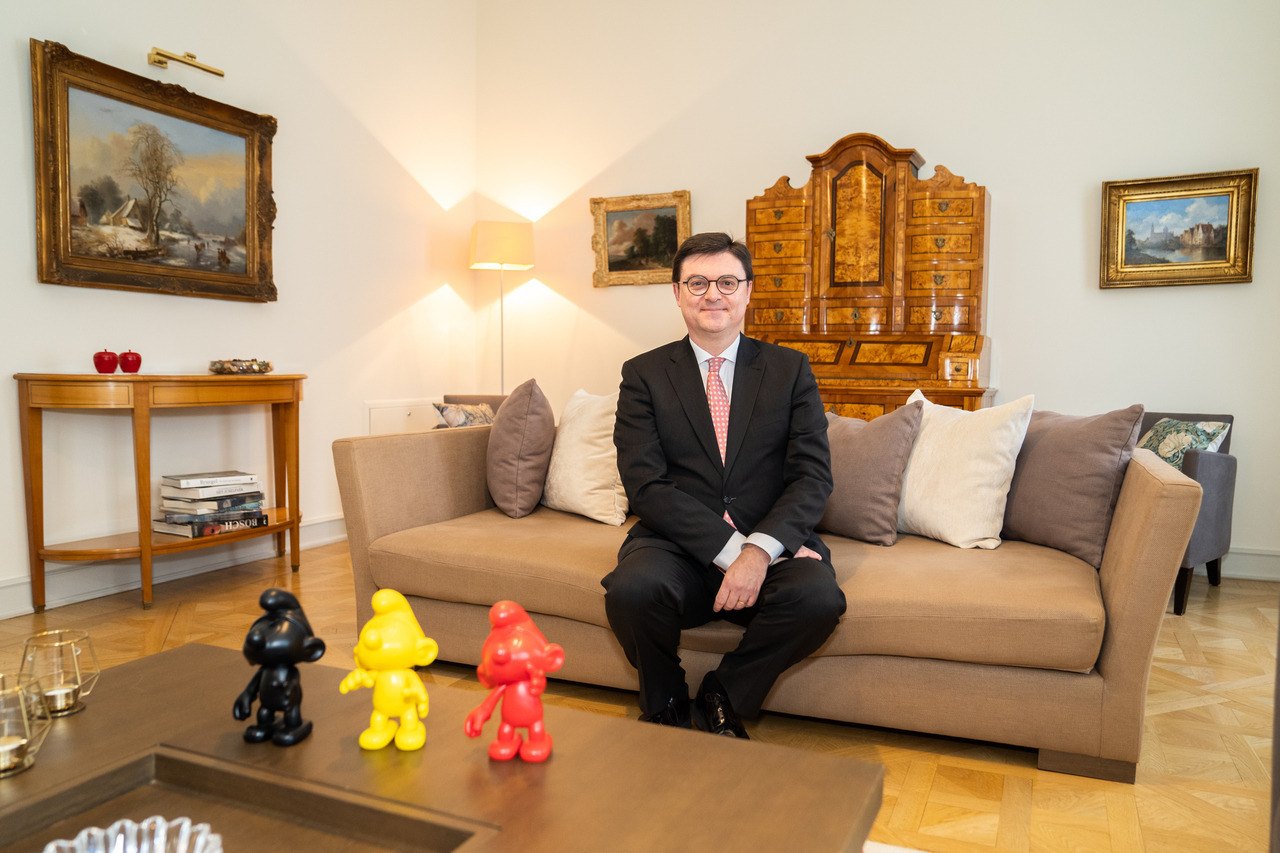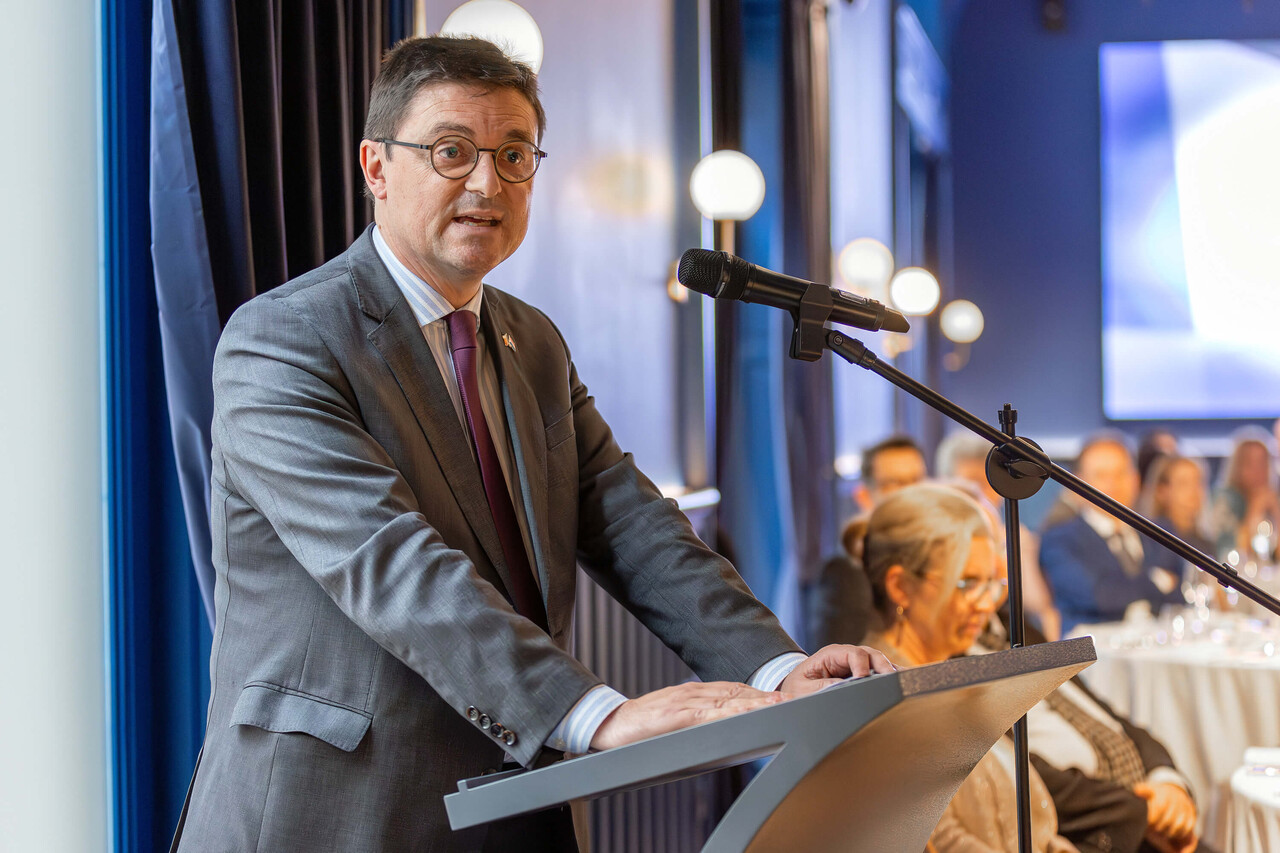Beyond ‘Brussels’: Belgian Ambassador Jeroen Vergeylen on EU unity, trade & culture in Hungary – EXCLUSIVE INTERVIEW

Today, July 21, Belgium’s national holiday, H.E. Jeroen Vergeylen, Ambassador of Belgium to Hungary, reflects on the values rooted in his country’s foundation, the evolving bilateral ties with Hungary, and Belgium’s commitment to shared European goals. In an exclusive interview, he shares insights into diplomacy beyond the politics of “Brussels,” opportunities for deeper cooperation, and why Belgian investors, artists, and chocolate continue to leave their mark in Hungary.
Daily News Hungary: The Belgian National Day is on 21 July. What exactly are the Belgians celebrating on this day?
H.E. Jeroen Vergeylen: We commemorate the oath taking of the first King of the Belgians, Leopold I, on 21 July 1831, the year following our independence in 1830. The first King’s oath included a pledge to respect the Constitution , an act that made him one of the first constitutional monarchs, subjected to the people represented in parliament, quite a modern approach in those days.
On top of that, the Belgian constitution of 1830 was one of the most liberal ones in Europe at the time. It contained fundamental values like the freedom of the press, of religion and of education. That is why Belgium attracted many modern thinkers and freedom fighters, including, for example, Lajos Kossuth, who lived in Brussels for a while before travelling on to the United States.
Kossuth’s mother, who had fled Hungary with him, stayed in Brussels, where you can still visit her tomb. Since those early days, Belgium has been an open-minded country, characterized by liberal values, free enterprise, individual rights, multilingualism, cultural diversity and high-quality life for everyone. Those are the values we celebrate on 21 July.

DNH: Brussels, as the EU’s stronghold, often has a negative portrayal in the Hungarian Government’s communications. While the message has been simplified for the electorate, Belgium itself is seldom the target. How would you describe the current diplomatic relations between Belgium and Hungary? What are the key areas of cooperation, and where do you see room for improvement?
Vergeylen: We understand that criticism of “Brussels” is targeted at the EU institutions and never at our Belgian capital as such. We kind of got used to it. I guess it’s the price we pay for hosting the institutions. But I must admit that it does hurt a little – Brussels still is the name of our Belgian national capital, after all.
The strictly bilateral relations between Belgium and Hungary, however, are strong and constructive, grounded in our shared EU and NATO membership. As founding member and host of both the EU and NATO, Belgium will always defend these organisations. It does not mean that we are never critical, it means that we value them greatly and will always strive to protect them and to cooperate to make them better and stronger.
While there are clear differences in viewpoints between the Belgian and Hungarian governments on certain EU principles and policies, we always engage in an open and respectful dialogue to ensure a unified approach to common challenges, based on shared interests. We collaborate closely on a range of EU issues, particularly in areas such as the competitiveness agenda, which has become our shared priority.
Belgium and Hungary are similar in many ways. We are two medium-sized EU member states, with open economies that rely heavily on free trade, open markets, and foreign direct investments. We are both centrally located in our respective parts of Europe and therefore key countries for logistic connectivity.
We are both characterized by a strong SME fabric that have all to gain from innovation. Our economic ties are robust, with Belgium being one of Hungary’s key trading partners within the EU. There is room for more growth in sectors such as logistics, defence, pharma and hi-tech applications.

DNH: As Belgium’s ambassador to Hungary, what are the most important messages you would like to convey to Hungarian society?
Vergeylen: I would like to convey a message of mutual respect and highlight the importance of collaboration. Belgium and Hungary share a deep European bond. We understand from our history what it is to be surrounded by great powers and to be the battlefield of Europe.
It is crucial that we continue to work together to strengthen the European Union, which is the best guarantee to preserve economic growth, and to address global challenges like security, including economic security, climate change, migration and social protection. Additionally, I would emphasize the value of cultural exchange and people-to-people connections, which are key to understanding each other’s traditions and to forging lasting friendships.
Belgium and Hungary have a centuries’ long historic relationship and the contributions of the Belgian community in Hungary, as well as the Hungarian community in Belgium, are immense. We should use that solid foundation to build our common future.
DNH: In recent years, migration has been a central topic in Europe. How do you see Belgium’s role in this issue, and what is your assessment of Hungary’s approach to migration policy?
Vergeylen: Migration remains a central topic in Europe, and Belgium views it as both a matter of opportunity and shared responsibility. Belgium aims for a proactive migration policy that does not harm countries of origin, by fostering sustainable, transparent, and mutually beneficial partnerships.
A significant part of Belgian society has roots in immigration. Immigration has had a positive effect for Belgian society, one that can be seen in our politics and cultural life, but also in economic terms. If Belgium has one of the highest income per capita ratios in Europe thanks to our high productivity, it is certainly partially thanks to the contribution that various migration waves, including from Hungary, had on our prosperity.
At the same time, Belgium is not blind to negative effects of uncontrolled migration on society as a whole, but also on migrants themselves, who are too often exposed to life-threatening risks by illegal practices and human smugglers. Belgium is committed to stopping illegal and abusive immigration, to achieving more effective returns, in compliance with international law, while ensuring that legal migration, for work or study, continues to contribute to our economic and social development.
Belgium will also continue to advocate for the implementation of the European Pact on Asylum and Migration, which was approved last year during the Belgian presidency of the Council of the EU, but more work is necessary.
Belgium believes that open dialogue and cooperation at the EU level are essential to finding sustainable and humane solutions to migration, ensuring that the challenges are addressed collectively, with respect for human dignity and security for all.
DNH: What is the Belgian government’s perspective on the current geopolitical landscape, particularly with regard to the Russia-Ukraine war and the Israel-Palestine conflict, which has now escalated into a broader Middle Eastern crisis?
Vergeylen: The Belgian government views the current geopolitical landscape with great concern, particularly in light of the Russia-Ukraine war and the ongoing Israel-Palestine conflict. To effectively tackle these challenges, it is crucial to maintain a strong and united EU approach, ensuring coordinated action and resilience in addressing these crises. Unity is our strength; division is our weakness, which is why our adversaries are always trying to sow division among us. We should not fall into that trap.
Belgium strongly condemns Russia’s unprovoked and illegal aggression against Ukraine and is committed to supporting Ukraine’s sovereignty and territorial integrity. The war in Ukraine is also about Belgium’s, the EU’s and every other member state’s security. Our position is that the war must be stopped. Russia could do that immediately if it had the will to do so. If it does not, Ukraine will need to continue to defend itself and we will need to continue to offer our help in any way we can.
At the same time, we must strive for a just and lasting peace. In the meantime, we must support Ukraine with all our might and the best way to do that is by working together at the EU level and with our other partners and allies. We also believe that Ukraine is entitled to become a member of the EU if and when all conditions are met. There can be no shortcuts, but also, no unjustified delays.
In the Middle East, where we are witnessing the most horrendous violations of human rights and international law, Belgium advocates for a two-state solution to the Israel-Palestine conflict and calls for peaceful dialogue, supporting efforts to de-escalate tensions, prevent further violence, and protect civilians.
Belgium’s broader approach focuses on diplomacy, multilateralism, and ensuring that international law and human rights are respected everywhere. It is important to underline that Belgium does not take sides: we work with all those who want to promote peace and advocate respect for international law by all parties. In the meantime, access to impartial humanitarian assistance must be ensured at all times.
DNH: How would you evaluate the trade relations between Belgium and Hungary, and which areas hold the most potential for further strengthening these ties?
Vergeylen: The trade relations between Belgium and Hungary are strong. Our bilateral trade amounts to more than 7 billion euros annually and we are the 12th biggest foreign investor in Hungary, providing jobs and livelihoods for more than 9,000 Hungarian families.
The largest Belgian company present in Hungary is the K&H Bank and Insurance, owned by the Belgian KBC Bank group. It is the third largest commercial bank in Hungary, with more than three thousand Hungarian employees. There are also significant investments in other sectors such as agriculture, food, logistics, and construction.
A large part of our bilateral trade consists of chemicals and pharmaceuticals, an industry in which Belgian companies are market leaders in Europe and very active in Hungary. Belgian companies and the Port of Antwerp-Bruges also participate in the car manufacturing supply chains which contribute greatly to the Hungarian economy. With the perspective of EU enlargement to the Western Balkans, Ukraine and Moldova, Hungary’s key geographic location could unlock a significant increase for our bilateral trade volume in all these sectors.
DNH: Belgian chocolate and beer are renowned worldwide, but which Hungarian products are popular in Belgium?
Vergeylen: Belgian chocolate and beer are indeed beloved worldwide, but Hungary also exports several products that enjoy popularity in Belgium. Hungarian wines, particularly those from the Tokaj region, are highly appreciated, as well as Hungarian paprika, which is a staple in many Belgian kitchens.
DNH: Last time a major Belgian hotel chain opened its fifth hotel in Budapest. Could you highlight some other significant Belgian companies that are active in Hungary?
Vergeylen: The fifth Belgian Three Corners hotel in Budapest, situated on Nagymező utca in the heart of Pest, is indeed a true Belgian success story in Hungary. In addition, several other Belgian companies have a significant positive impact.
Notably, companies like the bank and insurer K&H, Soudal (silicones, foams and adhesives), Carmeuse (production of lime and limestone products), Puratos (bakery products and chocolate), Gosselin (transport and logistics), Beltaste (food products), Hunza (ecotourism), Terra Ungheria and Domani (ceramics) are all active in Hungary.
These companies cover a wide range of sectors, underscoring the growing economic ties between our two countries. This year is also special as we are celebrating the 10th anniversary of BELGABIZ, the dynamic Belgian Business Club in Hungary.
DNH: While we are well-acquainted with the beauty of cities like Brussels, Ghent, and Bruges, are there any smaller Belgian towns whose architecture or atmosphere deserves more attention?
Vergeylen: While cities like Brussels, Ghent, Antwerp and Bruges are internationally renowned, there are indeed smaller Belgian towns that are worthy of recognition. Towns like Leuven, home to one of the oldest universities in Europe, celebrating its 600th anniversary this year, are filled with rich history and beautiful architecture.
Mechelen, with its medieval buildings, is another hidden gem, boasting stunning churches, museums, and a charming old town. Additionally, the town of Dinant, with its striking cliffside views and historical fort, offers a beautiful blend of nature and culture and is the birth place of Aldophe Sax, the inventor of the saxophone.
Liège impresses with its dynamic energy and lively arts scene, all set against the backdrop of a city that blends industrial heritage with bold architecture. I could also mention Namur, nestled at the confluence of the Meuse and Sambre rivers, with its majestic citadel and charming old town.
And don’t forget Eupen, the capital of the German-speaking community in the country’s east, with its picturesque nature at the gateway to the High Fens nature reserve. Finally, the Belgian Coast is a good destination, if only to enjoy the dunes in Koksijde or taste fresh shrimp croquettes.
DNH: Budapest and Lake Balaton are Hungary’s most popular tourist destinations. Do you have any personal favourites outside of these two?
Vergeylen: Outside of Budapest and Lake Balaton, Hungary has many wonderful regions worth exploring. I particularly love the city of Pécs, which offers a unique blend of cultural influences and diverse architecture. The museum pass allowed me to visit five museums there in two days, including the Csontváry, Vasarely and Zsolnay museums, all with worldclass collections.
I also have a special connection with Debrecen, a city with a strong Dutch-speaking tradition through its Calvinist past, where Dutch – one of Belgium’s national languages – is still taught at its famous university. The region of Tokaj, famed for its vineyards and wine-making traditions, also stands out as a peaceful and picturesque destination.
I had the privilege of spending a relaxing family holiday there. I would love to explore lesser-known villages along the Danube Bend, which offer rich history, traditional Hungarian culture, and stunning landscapes.
DNH: How important are cultural relations between Belgium and Hungary? What cultural programmes have been organised this year, or are planned for the coming year, to foster closer connections between the two countries?
Vergeylen: Cultural relations between Belgium and Hungary are of great significance, with both countries actively organizing events to showcase their rich traditions and strengthen connections.
Recently, the Belgian Embassy in Hungary has supported a range of cultural activities, including the screening of a Belgian movie at the 15th Festival du Film Francophone. One of the other highlights was the “Comic Strip Tour of Belgium” exhibition at the Universities of Pécs, Corvinus and ELTE, that offered a view of Belgium through the unique world of its world-famous comic strips.
In addition, Hungary welcomed the Royal Philharmonic Orchestra of Liège, conducted by Hungarian conductor Gergely Madaras, as part of their Hungarian tour. The orchestra delivered unforgettable performances in some of Hungary’s finest concert halls, including the Liszt Academy in Budapest, Hangvilla in Veszprém, and the Kodály Centre in Pécs—a perfect opportunity to present the best of Belgian culture to Hungarian audiences.
Last year, we were very proud to support the Belgian week at MÜPA under the aegis of the Bridging Europe Festival, this time linking Budapest to Brussels with a week-long programme of Belgian concerts, film screenings, and an exhibition of the art nouveau architects Victor Horta and Ödön Lechner.
Looking ahead, we plan to organize more of these initiatives aimed at celebrating the artistic and cultural heritage of both countries.
DNH: And finally, on the topic of gastronomy: when you dine at a Hungarian restaurant, what would your ideal choice of starter, main course, and dessert be?
Vergeylen: When dining at a Hungarian restaurant, I would likely begin with a classic gulyásleves (goulash soup), a hearty and flavourful dish that beautifully represents Hungarian cuisine. I’d like it rather spicy, please. For the main course, I would definitely opt for a juicy chop of mangalica, ideally. I would suggest to serve it with some Brussels sprouts, accompanied by a good glass of a sunny Villány red wine. To finish, an Esterházy slice of cake would be my choice for dessert. We Belgians and Hungarians are clearly known for our love of light food (smile).
Read more interviews on Daily News Hungary!
Read also:






